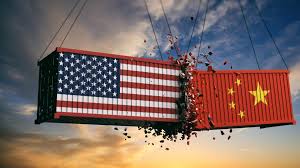China, U.S. to resume trade talks but China says demands must be met

China said on Thursday it hoped U.S. officials would bring a problem-solving attitude to renewed trade talks in advance of a meeting between Presidents Donald Trump and Xi Jinping next week in Japan.
Negotiations to reach a broad trade deal broke down last month after U.S. officials accused China of backing away from previously agreed commitments.
A telephone call between Trump and Xi on Tuesday, as well as confirmation the two will meet in Japan on the sidelines of a Group of 20 summit, have rekindled hopes of a detente.
“The heads of the two trade teams will communicate, according to instructions passed down from the two presidents,” Chinese commerce ministry spokesman Gao Feng told reporters.
“We hope (the United States) will create the necessary conditions and atmosphere for solving problems through dialogue as equals.”
U.S. Trade Representative Robert Lighthizer said on Wednesday he would speak by telephone to Liu He, China’s vice premier and chief negotiator in the trade talks, “in the next day and a half.”
The two countries have imposed tariffs on each other’s imports, disrupting global supply chains and roiling financial markets. China has vowed to not give in to U.S. pressure on issues of principle.
Trump has threatened to extend tariffs to another $ 300 billion worth of goods, covering nearly all remaining Chinese imports into the United States, including consumer products such as cellphones, computers and clothing.
China says three main sticking points remain between the two sides in trade negotiations. They are the removal of tariffs imposed in the trade war, the scale of goods purchases from the United States that China will make to help reduce the trade imbalance between the two, and the need for a “balanced” text for any trade deal. Those “matters of principle” cannot be compromised, China has said.
However, Gao still expressed optimism about the possibility of agreement on issues such as structural economic reform, implementation, protection of intellectual property (IP) rights and market opening.
“Both sides have immense mutual interests. I believe by taking care of each other’s concerns through equal dialogue, both sides will for sure be able to find a solution to solve the problems properly,” Gao said.
U.S. BUSINESS
The U.S. Trade Representative on Thursday was holding the fourth of seven days of hearings for manufacturers, retailers and other U.S. businesses to comment on the proposed tariffs. Individuals and firms can also submit comments to an online government docket.
Apple Inc weighed in with a comment filed online on Thursday that the proposed tariffs on goods including iPhones, iPads, and Macs will hurt its global competitiveness.
The company also noted that tariffs would reduce its contribution to the U.S. Treasury. The company is the largest U.S. corporate taxpayer and pledged in 2018 to directly contribute over $ 350 billion to the U.S. economy over five years.
The Trump administration has accused China of failing to protect IP, forcing U.S. companies to transfer technology to Chinese partners, and failing to provide a level playing field for U.S. companies.
China has repeatedly promised to open its market wider to foreign investors and provide them with better services and treatment.
Speaking to a group of 19 chief executives of foreign multinationals in Beijing on Thursday, Premier Li Keqiang reiterated those promises.
“China will maintain our long-standing commitment to reform and opening in order to continue to expand and open. We welcome more and more foreign investment to come to China,” Li said, in comments in front of reporters.
“We will also relax (restrictions on) access to even more fields to create a market-oriented, law-based internationalised business environment.”
LOSE-LOSE
Neither side has signaled it would shift from positions that led to the impasse last month, when Beijing revised a draft of the trade deal, removing references to changes in Chinese law.
While talks between Xi and Trump in Japan were unlikely to resolve major disagreements immediately, they could start a new phase in negotiations, Chinese state media said on Thursday.
The official China Daily said in an editorial both parties were “in the mood for serious dialogue” as a full-blown trade war was “lose-lose”, but one single meeting was unlikely to wrap everything up.
“More likely than not, the one-on-one meeting will end up being the start of a new phase in the negotiations with the two leaders personally setting out their country’s respective bottom lines,” it said.
China has managed to get the United States back to the table with its determination and ability to “prepare for war”, Taoran Notes, a widely read and influential WeChat account run by the Economic Daily, wrote late on Wednesday.
“Only by being able to fight, daring to fight and being good at fighting can you stop a war,” it wrote.
President Xi was in North Korea on Thursday on a two-day trip, the first by a Chinese leader in 14 years, re-asserting a key leverage point China has as Pyongyang’s only major ally.
Denuclearisation of the Korean peninsula is one of Trump’s foreign policy priorities, but Pyongyang has resumed some weapons tests since a summit with North Korean leader Kim Jong Un collapsed in Hanoi earlier this year.
“The international community hopes that North Korea and the United States can talk and for the talks to get results,” Chinese state TV paraphrased Xi as telling Kim.
